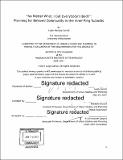| dc.contributor.advisor | Mariana Arcaya. | en_US |
| dc.contributor.author | Carroll, Leigh Marissa | en_US |
| dc.contributor.other | Massachusetts Institute of Technology. Department of Urban Studies and Planning. | en_US |
| dc.date.accessioned | 2017-09-15T15:31:34Z | |
| dc.date.available | 2017-09-15T15:31:34Z | |
| dc.date.copyright | 2017 | en_US |
| dc.date.issued | 2017 | en_US |
| dc.identifier.uri | http://hdl.handle.net/1721.1/111379 | |
| dc.description | Thesis: M.C.P., Massachusetts Institute of Technology, Department of Urban Studies and Planning, 2017. | en_US |
| dc.description | Cataloged from PDF version of thesis. | en_US |
| dc.description | Includes bibliographical references (pages 117-119). | en_US |
| dc.description.abstract | Throughout the history of the United States, civil rights movements have been inspired, moved to action, and given courage by the vision of a "beloved community." This thesis posits that urban planning fields, too, should take this vision seriously as a guide for designing community development strategies that create more opportunities for active love and relationship across deep social divides. This research explores what planning for beloved community might look like in practice, using Bellevue, an inner-ring suburb of Pittsburgh, Pennsylvania, as a case study from which to glean lessons for broader planning practice. The research analyzes data from 26 interviews and focus groups with 21 high school students to understand whether and how planning with an explicit aim to strengthen relationship across difference (such as race and class) can generate community strategies different than those currently recommended in the planning literature. The data reveal that this type of planning ultimately has potential to reframe a community's assets and challenges in a way that can identify strategies not proposed in typical planning approaches, illuminate more radical ideas for local planning intervention (for example, rejecting the exclusivity of local school district boundaries, redesigning policing institutions to be care-focused, or building upon local resistance to materialism and class consciousness), challenge planners to become more vulnerable to deep relationship in their community engagement practices, and shift perceptions of who can be planner by illuminating skills that are often undervalued in education and career pathways. In the face of many failed approaches for achieving and maintaining equity between groups of people, generating strategies that support relationships across race, class, and other divides may be a valuable focus worth reinvigorating in the planning profession. | en_US |
| dc.description.statementofresponsibility | by Leigh Marissa Carroll. | en_US |
| dc.format.extent | 124 pages | en_US |
| dc.language.iso | eng | en_US |
| dc.publisher | Massachusetts Institute of Technology | en_US |
| dc.rights | MIT theses are protected by copyright. They may be viewed, downloaded, or printed from this source but further reproduction or distribution in any format is prohibited without written permission. | en_US |
| dc.rights.uri | http://dspace.mit.edu/handle/1721.1/7582 | en_US |
| dc.subject | Urban Studies and Planning. | en_US |
| dc.title | "No matter what, I got everybody's back" : planning for beloved community in the inner-ring suburbs | en_US |
| dc.title.alternative | Planning for beloved community in the inner-ring suburbs | en_US |
| dc.type | Thesis | en_US |
| dc.description.degree | M.C.P. | en_US |
| dc.contributor.department | Massachusetts Institute of Technology. Department of Urban Studies and Planning | |
| dc.identifier.oclc | 1003291593 | en_US |
